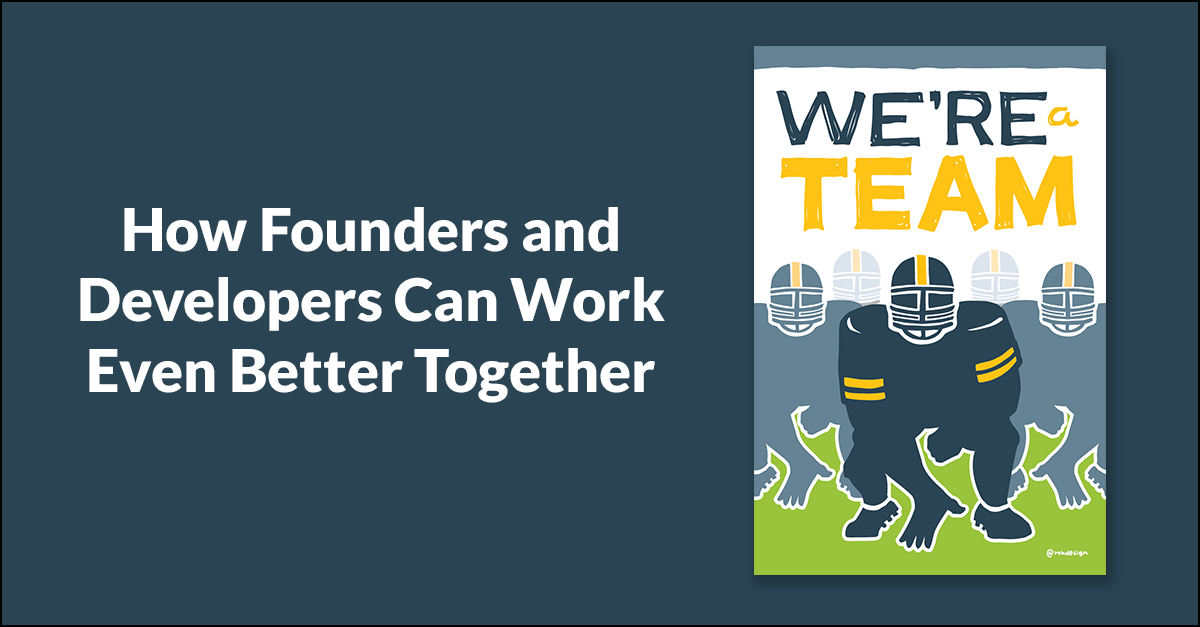
In startups and small businesses, especially in the tech world, founders and developers need each other. Founders bring the vision (and the funding), and developers bring the technical expertise to turn that vision into reality.
We have a lot of experience as both founders and developers, so we have some good insights into the needs of each. Most of the time, founders and developers work really well together, but there are ways to make sure that continues and improves over time.
Here are things for founders and developers to consider so they can work even better together.
What’s Important to Founders?
Tech startup founders are generally focused on one overarching goal: Providing a solution that brings value to or solves a problem for their customers.
While that’s their ultimate goal, it comes wrapped around a handful of other concerns related to the solution they’re building, such as:
- Timeline
- Budget
- Usability
- Quality
- Scalability
- Revenue
What’s Important to Developers?
While the developer’s goal generally aligns with that of the founder, they approach it in different ways, and developers tend to have a more tactical view of the software.
Developers need the information that will help them build an optimal software platform. Who are the users? What are their biggest pain points? What are they trying to accomplish by using the software?
Founders are responsible for communicating all of these details to the developer, along with project constraints like timeline, budget, and the revenue model being used.
Often times, founders play the role of product owner (PO) on the project, especially in the early days. Regardless of who the PO is, the developer will work closely with him or her on requirements, priorities, and planning.
Working Together to Reduce Anxieties
Because founders and developers have different approaches to reaching their shared vision of success, they each seek out different information. When the details someone cares about are missing, it can cause anxiety. Developers and founders can help alleviate
each other’s anxiety by communicating consistently and thoroughly.
Founders
Founders are constantly thinking about the business: funding, revenue, customers, marketing. They’re typically wearing multiple hats and juggling lots of projects, too, so strong communication from developers about things like project timelines
and budgets, development status, and outstanding questions can ease a founder’s mind.
Developers
In general, developers are most comfortable when they have all the information they need to build high-quality software. Helpful information for developers includes:
- Clear requirements
- An understanding of priorities
- Timely feedback
- Wireframes and designs to reference
By understanding these anxiety inducers and communicating about them, developers and founders can help keep things moving smoothly.
Communicate, Communicate, Communicate
The best way for founders and developers to stay on the same page is to maintain open and honest communication.
Founders can help developers by communicating about the business value of the software platform, the problem it’s solving, and who your customers and users are. It’s important to provide timely feedback and make yourself available for
meetings, demos, and working sessions. In general, you’ll want work to avoid micromanaging the developer— set expectations for communication and results, and then let them have the space they need to execute.
Developers can help founders by communicating thoroughly about what you’re working on. Provide estimates however you’ve decided as a team makes the most sense; share budget and timeline updates often; and be open about the work that’s
completed, in progress, and planned. You also need to have demo presentations to walk the founder and other chosen stakeholders through the system on a regular basis.
Overall, both founders and developers will work even better together if both can maintain a sense of empathy toward each other.
Tools and Strategies for Improving Communication
Show Your Work
One of the most oft-overlooked, yet impactful, things founders and developers can do to stay in sync is to make the work visible. A developer may be working on all the right things, but if the founder doesn’t know about it, they may instinctually
question what’s happening. Here are the ways we document work to make sure everyone’s on the same page:
- Source Code – Even if the founder isn’t a developer, it can be beneficial to share pull requests and commits in the source code, and to conduct code reviews and have conversations about the code. Tools like GitHub, BitBucket, and
GitLab are great for making these items visible.
- Work Being Done – Priorities and requirements should be documented and fleshed out. We do this in the form of user stories with acceptance criteria and estimates managed in the product backlog. There are countless project management tools
to make work visible, but the more common scrum-focused ones are Targetprocess, Trello, and Jira.
Structure Your Communication
It’s easy to assume that communication, especially within a small team, will happen naturally. But we all know what they say about assuming. To ensure consistent communication, it’s important to set expectations, lay out best practices, and
have efficient tools in place.
There are many communication tools available, but some of the most common include the following.
Instant Messaging
Project Management
These tools can be used in conjunction with your scrum management tool or you can keep it all in one. We use Targetprocess for sprint planning and documenting requirements, and Basecamp for client communication.
Conference Calls and Screensharing
- Zoom
- Slack
- Skype
- GoToMeeting
To summarize, our top tips for a successful working relationship between founders and developers are:
- Communicate
- Communicate
- When in doubt, communicate
If you’re looking for a developer to help build out your product, reach out.